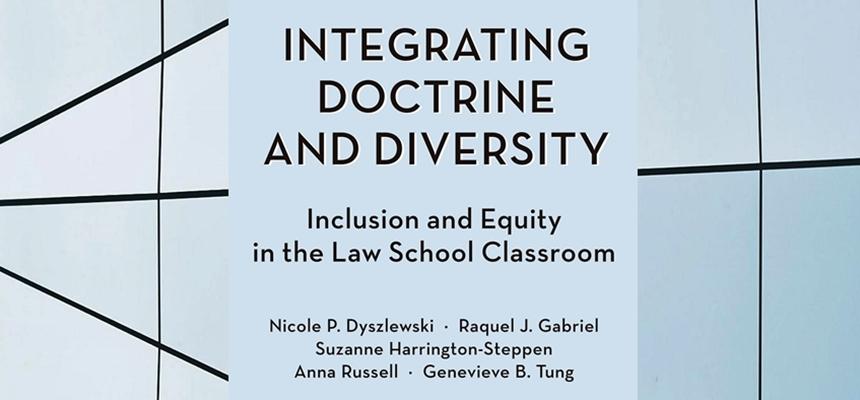
Integrating Doctrine & Diversity
RWU Law staff produce a compelling, timely book and speaker series covering specific ways to integrate diversity, equity, and inclusion into the law school curriculum.
In the 2021-22 school year, RWU Law co-sponsored, along with the City University of New York School of Law and Jurist, an ongoing Integrating Doctrine & Diversity Speaker Series. Each of the five installments to date have drawn hundreds of legal education professionals from across the country. In the 2024-25 school year we are back again, along with additional co-sponsors the University of California - Berkeley School of Law, George Washington University School of Law, and Antiracist Development Institute. Join us throughout the school year to learn more practical strategies for integrating DEIB skills and concepts throughout the law school curriculum.
Based on a 2021 book – Integrating Doctrine and Diversity: Inclusion and Equity in the Law School Classroom, whose co-editors include two RWU Law instructors – the series focuses on practical strategies for putting DEIB goals into action.
“I’ve received so much positive feedback from students, alumni, librarians across the country, and others,” said Nicole P. Dyszlewski, one of the book’s co-authors and a primary organizer of the speaker programs. “The comment I’ve heard the most is how engaged and thoughtful everyone is.”
In 2024, a companion volume to Integrating Doctrine and Diversity: Inclusion and Equity in the Law School Classroom featuring new essays, case studies, and bibliographies for law faculty seeking to bring critical perspectives on equity, inclusion, and social justice into their teaching in upper-level courses. This book, Integrating Doctrine and Diversity: Beyond the First Year, may be purchased here.
Watch previous sessions of the Integrating Doctrine & Diversity Speaker Series:
September 2024: Breaking Bias: A Conversation with Attorney Anu Gupta
April 2024: A Dialogue with Dean Danielle M. Conway of Penn State Dickinson Law
February 2024:
February 28: Inclusive Legal Education: Navigating Faculty-DEIB Collaborations
February 15: "Beyond the First Year" Vol. 2 Book Release Celebration
November 2023: Beyond the Casebook: DEIB and Supplementary Materials
October 2023: How Does Diversity, Equity, Inclusion and Belongin Pedagogy Fit in Issues and Financial Affairs Classes? Leading with DEIB in Wills, Trusts, Estates, Insurance, Contracts, and Taxation Law Classes.
September 2023: Can the Socratic Method be used in an Inclusive Classroom?
May 2023: Responding to Classroom Controversy
May 2023: Moving Beyond the Box & Reconsidering the Criminal History Question on Law School Admission Applications
November 2022: Teaching Diversity Skills in Bar Tested Classes
October 2022: Integrating Content on American Indian Law and Indigenous Identities
September 2022: Making Changes, Making Mistakes (Part 2)
April 2022: Auditing Your Syllabus and Classroom Materials
March 2022: Making Changes, Making Mistakes
November 2021: Making Space, Taking Space
October 2021: When Law School Classroom Discussions on Diversity Go Wrong
September 2021: Book Release Kickoff Celebration
